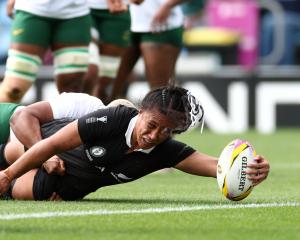Watching the Black Ferns lose to England on Sunday was a hard pill to swallow, but it was medicine that needed to be taken.
The New Zealand women's rugby team last lost to England eight years ago.
I can still visualise this loss as if it happened yesterday, because I remember begging my stumpy hooker's legs to run faster as the speedy English winger ran three quarters of the field to score a try.
Unfortunately, my legs were not co-operating and our 10-year winning record came to an end.
Suffering a loss at the hands of the English a year before the Women's Rugby World Cup turned out to be a blessing in disguise, so I'm hoping members of the 2009 team who are preparing for the World Cup next year can find some positives from their loss.
In 2001, we were afraid of losing and that was projected in the way we physically and mentally prepared for and played that game.
We played defensively, and limited our flair by resorting to safe tactics.
What did we change in 2002 in order to beat England in the World Cup final in Barcelona? On a recent television show, former Kiwis coach Brian McLennan said: "You've got to love winning more than you hate losing."
This simple change in mindset is what we did.
There is nothing like losing to make you realise that resting on your laurels does not cut it in elite sport.
We also wanted to play an exciting and innovative style of rugby and that is impossible when individuals are too afraid to try new things, or make risky decisions.
The opportunities for women's teams to dazzle and impress spectators live and via the media are few and far between, so when an opportunity arises, women have to grab it with both hands or feet and put on a spectacle.
The only way this can be done is with long-term preparation and planning, fit and skilful athletes, a great game plan, and the right mindset.
The most spectacular game I remember playing was at Carisbrook in 1997 as a curtain-raiser for the Bledisloe Cup test.
We played in front of thousands of scarfies who can always be counted on to turn up early to a rugby game.
We also thrashed the Australian women 40-0, so the tryfest brought us some new fans, silenced some cynics, and won over some supporters in that blissful 80 minutes.
Oh yes, and the All Blacks lost to the Wallabies, which meant the public and media gaze fell on us for a brief moment.
Comparing men's and women's teams in the same sport is always going to happen, and, in a twisted way, when men's teams don't do so well, women's teams get attention.
Being told that the women are better is a backhanded compliment for the women, and a slap in the face for the men's teams.
At Twickenham, it was the first time a women's game acted as a curtain-closer rather than a curtain-raiser to a major men's test.
I'm not too sure if it was an effective way of promoting the game, especially when the game produced only one try and many handling errors.
The men's game produced just one try as well and the All Black performance has received criticism, but we've all heard the saying that women have to work twice as hard to be considered half as good.
It is often assumed that women's rugby is strong in New Zealand because rugby is our national sport and the national women's team has won the last three world cups, but the rest of the world is catching up.
The 2010 World Cup is nine months away and there is a lot of work to be done before then if the Black Ferns are going to be world champions for the fourth time.
The organisers of the 2011 Rugby World Cup want to demonstrate that we are a rugby nation, but does that apply to the women's game? In the professional era and times of economic recession, administrators are always looking at ways of cutting the budget.
That often means women's sports programmes and teams have their opportunities limited.
Until women's teams get more in the way of independent media attention and funding, they have to be content with riding on the coat tails of events where men are centre stage.
From the edges they must give exceptional performances and hope for the best.












